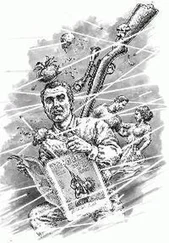Аврам Дэвидсон - Peregrine - primus
Здесь есть возможность читать онлайн «Аврам Дэвидсон - Peregrine - primus» весь текст электронной книги совершенно бесплатно (целиком полную версию без сокращений). В некоторых случаях можно слушать аудио, скачать через торрент в формате fb2 и присутствует краткое содержание. Год выпуска: 1971, ISBN: 1971, Издательство: New York : Walker, Жанр: sf_all, на английском языке. Описание произведения, (предисловие) а так же отзывы посетителей доступны на портале библиотеки ЛибКат.
- Название:Peregrine : primus
- Автор:
- Издательство:New York : Walker
- Жанр:
- Год:1971
- ISBN:0802755461
- Рейтинг книги:5 / 5. Голосов: 1
-
Избранное:Добавить в избранное
- Отзывы:
-
Ваша оценка:
- 100
- 1
- 2
- 3
- 4
- 5
Peregrine : primus: краткое содержание, описание и аннотация
Предлагаем к чтению аннотацию, описание, краткое содержание или предисловие (зависит от того, что написал сам автор книги «Peregrine : primus»). Если вы не нашли необходимую информацию о книге — напишите в комментариях, мы постараемся отыскать её.
Peregrine : primus — читать онлайн бесплатно полную книгу (весь текст) целиком
Ниже представлен текст книги, разбитый по страницам. Система сохранения места последней прочитанной страницы, позволяет с удобством читать онлайн бесплатно книгу «Peregrine : primus», без необходимости каждый раз заново искать на чём Вы остановились. Поставьте закладку, и сможете в любой момент перейти на страницу, на которой закончили чтение.
Интервал:
Закладка:
“H as that engrosser finished those documents I—he has. Good. Hnd ’em up, hmm, hmm, The Senate and the People of Rome hmble hmble hmble, To Have and to Hold From This Day Forward, hmpty hmpty hmpty, blbbble blibble, blibble, great martyred minnesingers! I could annex Parthia with fewer words than this!—where the Hell—oh—here— EXEMPT FROM SEIZURE: CAESAR. There. That’ll do it. I hope. Here you are, mboy. Don’t forget the presents for Austin. And, should you by any chance reach the far-off Land of Silk, Sina or Kina or whatever they call it, remember to send me word if it’s true that the women there— you know! Eh? Very well. And now . . . oecumenicism and tolerance is all very well, but leave Us not forget Our priorities.” He raised his hand and made a sigilation over Peregrine’s head, his lips meanwhile moving in a short and silent blessing.
Next, with elaborate formality, he wheeled his horse around and had it take four paces; then, the pious proprieties satisfied, he wheeled the horse around again and looked on with great in
terest as Appledore commenced his own ceremony. It involved, of course, corn and wine and oil and salt and water, and was concerned with earth and air and had some reference to fire as well. Peregrine apprehended that he was being made free of good things, commended to the protection of good spirits, warded against several sundry sorts of harm: and then the ceremony simply passed beyond his apprehension. Briefly, he was reminded of the sage’s twice prior Fetching of the Winds, and of the cry of a sea-bird on a stormy sea .... But there were differences . . . there were now neither storms nor sea, only swiftly-rushing air, and though the chant (now it rose and now it fell) did somehow put him in mind of birds, they were not sea-birds.
He suddenly blinked, realized that Appledore had finished, and that the sounds he heard were those of Caesar’s party, vigorously expectorating three times each and making horns and figs with their fingers in order to drive away any paganical daemons which might have been attracted. Peregrine embraced the sage, embraced Claud, was tearfully embraced by Philoxena, had his hands clasped by Darlangius and in turn kissed Darlangius’s hands. The trumpeters blew long blasts on their long bellmouthed instruments, the Archbishop of Chiringirium swung his censer, and everybody sneezed and gave three cheers. Then the two parties parted, and went their different ways.
Of all the beasts and gear with which he had set forth from his native country, Peregrine now retained but one pair of saddlebags. In it there still reposed such remnants of his father’s gifting as the pod of musk and the six measures (or whatever number) of barley-meal, and, packed between them and wrapped in the simple linen of country weave, there was a curious crown and the hilt of an equally curious sword and the shattered fragments of a blade—and none of these latter and rare things had been with him from the first.
Appledore and Claud had ridden away with him at that first; Appledore he had known for all his own young life, and Claud, for that matter, more or less. Now next to him rode Julianus! about whom he knew nothing, except that he rode very close to him indeed and never seemed to take his eyes away from Peregrine, save when he scanned the scene to assure himself of his young lord’s safety. Farther off, and looking exceedingly self-satisfied, was his new steward, one Sempronius. And the rest of
AVRAM DAVIDSON
[ 165 ]
the retinue he did not know at all, Caesar having appointed them.
The plowman followed his oxen, the birds followed the plowman, twenty servants followed Peregrine.
And Peregrine followed the road.
Already men were earning Caesar’s sesterces by commencing the work of repair on that road, and some did it merrily for reason of being able to get their bread and wine by honest time and toil, and some did it sullenly and with ill grace indeed for reason of being able to get their bread and wine by time and toil alone. The thicket was being cut back some distance away from the barm of the road as a discouragement to those who were willing to spend time lurking there in hopes of getting their own (or another’s) bread and wine without the need for any toil at all. The road led away from the river, and the view was of valleys, with far away a range of hills.
Presently noon came, but, so brisk and fresh the breeze that it was a noon without great heat; and no shadows streamed away from the great triple arch as they approached, or lurked round its feet like crouching dogs. And here the road divided, and became three. The captain of the guard saluted. Peregrine returned the salute, and then, by the man’s unrelaxed air being informed that something had not yet been performed that had to be, glanced aside in slight perplexity to Julianus. Who, with the slightest of movements, indicated his master’s other hand. “Of course,” murmured Peregrine.
He handed to the captain of the guard the pole of the pennant he had born hither from the city gates, purple with the caesarial diadem in gold, and the embroidered D. The captain saluted once again.
“And here ends the domain and the jurisdiction of my friend,” Peregrine said, to himself, yet aloud.
Respectfully, the captain of the guard pointed out that this was not altogether the case. “According to the Demarcations set forth the last time the Three Emperors met,” said the officer, “The boundaries of this province extend to those high hills yonder. However, sir, this much is so: that past this point, we do not patrol. Not yet,” he added.
Peregrine pondered. Then he said, “You will be able to tell me, though, where these three roads lead.”
What was probably a rare enough smile briefly creased the soldier’s sun-browned face. “Well does every school-boy, sir, know that all roads lead to Rome. However. This one here does indeed lead to Old Rome—and, before that, to Ravenna. And as well to the seaports whence, if one would wish, there go ships to such further places as Egypt . . . Mellita . .. Joppa—” He waved a hand, as though to indicate they both knew he could not name them all. “And this other one, here, leads to New Rome: which is to say, Byzantium, or Byzance-town. But this last one, over there . . He paused, and pursed his lips. “Its end, I do not know. Is there perhaps a third Rome, somewhere, sir?” He did not venture upon another smile, but it lay in his words.
Again Peregrine felt that strange stirring in his mind, and he groped towards his saddle-bags. Then it seemed to him that the gesture was without meaning, and another thought overcame it, “ Thalassa, thalassa he murmured.
“Ah, the sir knows the Grecian tongue,” the soldier said, looking mildly interested. “I know it not, myself, but once, years ago, I served under a centurion who did. And he told me that that means, ’The sea! The sea!’ and that these were the words the Greeks of long ago exclaimed when, after a long wandering out of Persia, they saw it before them.”
Two thoughts now smote Peregrine together. He remembered what was in the saddle-bag, besides the things he had recalled not long before. And he remembered something else as well. Now, easier might this one sib of his find his way through the trackless waste of the great northern forests, and up from the bottom of the deep, black sea ... He gave a slight shudder. And still the captain of the guard regarded him. And then the captain of the guard spoke.
“I have served six Caesars of Chiringirium,” he said. “And I hear that this new one is the best by far of all. Tomorrow they will come to offer us his bread and salt. I have no personal feelings against him. But it is now in my mind that perhaps six caesars are enough. One loyalty is ended, another has not yet begun. And in my mind, just now, has grown the thought that I might take leave of my post here, now, without dishonor.”
Читать дальшеИнтервал:
Закладка:
Похожие книги на «Peregrine : primus»
Представляем Вашему вниманию похожие книги на «Peregrine : primus» списком для выбора. Мы отобрали схожую по названию и смыслу литературу в надежде предоставить читателям больше вариантов отыскать новые, интересные, ещё непрочитанные произведения.
Обсуждение, отзывы о книге «Peregrine : primus» и просто собственные мнения читателей. Оставьте ваши комментарии, напишите, что Вы думаете о произведении, его смысле или главных героях. Укажите что конкретно понравилось, а что нет, и почему Вы так считаете.






